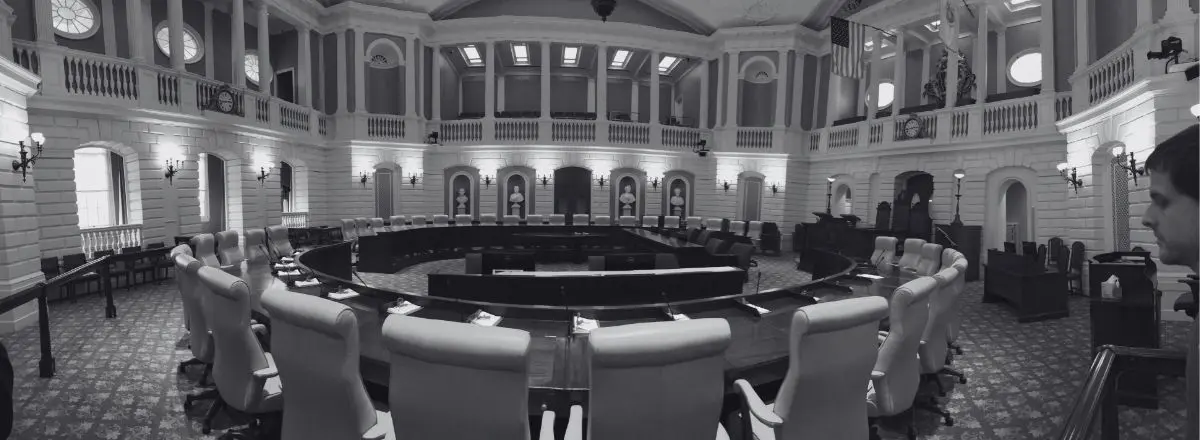The look and feel of Massachusetts sports betting branding and advertising will never be the same.
Following a long, drawn-out debate, the Massachusetts Gaming Commission narrowly decided to require age restriction language on "standalone logos" used by the state's licensed sports betting operators. According to a release, "the words '21 Plus' (or something similar must) appear alongside fixed-signage featuring the logos of sports betting operators visible 'in a sporting venue.'"
This sounds like a relatively minor development. And in some ways, it isn't a major shakeup. But it has been a hot button issue for sports betting in Massachusetts over the past few months. More pointedly, the state has been hyper-focused on monitoring and perfecting the regulatory arm of sports gambling since rolling it out in January of this year.
What will these branding changes look like in practice? What was the impetus behind them? Will other states follow suit? And do they say anything about the longer-term future of Massachusetts sports gambling?
Let's dig into all the details.
How will the New Age Requirement Stipulation Impact the Branding of Massachusetts Sports Betting Operators?
The new branding rules will result in mostly aesthetic changes. Most notably, though, they will only impact the logos in place at sporting venues. Bill Speros of Bookies.com unpacked the full details:
"Massachusetts sports betting operators were given 90 days to comply with the new rule. Those would include Fenway Park, TD Garden, Gillette Stadium, and Polar Park. State regulations already ban any sports betting advertising or presence at college or high school venues. In a compromise with Commissioner Eileen O'Brien, fellow Commissioners Jordan Maynard and Nakisha Skinner voted Thursday for a tone-down version of a proposal that would have required the '21 and Over' wording with all sports betting operator logos that were visible in to the public, including billboards, those on other objects, and corporate signage."
Though sports betting operators have by and large opposed this move, it sounds like they dodged a less palatable outcome for their own self-interests. The more aggressive requirements would have stipulated they include "21 and over" language on all of their advertisements, not just branded logos in certain locations.
At issue, of course, is the difference between "branding" and "advertising." Sportsbook operators insist logo-only signage is not a form of advertising; they instead argue it's branding. Those in favor of stricter Massachusetts sports betting regulations believe that logos (or branding) all count as a form of advertising.
For the most part, it seemed like the Massachusetts Gaming Commission (MGC) would favor the broader policy. However, in an effort to expedite the age-requirement language, they relented and allowed for a differentiation. Granted, not everyone was on board with the compromise. As Commissioner O'Brien alluded to, all the best online sportsbooks in the United States already include legal disclaimers on their web sites, audio ads and video commercials. Why should physical advertisements (such as billboards) be exempt?
Why is Massachusetts So Focused on Communicating Age Limitations for Sports Gambling?
Underage gambling has been under the MGC's microscope since before the debut of sports betting in the state. Along with Ohio, Massachusetts has led the way in attempting to crack down on what they consider rogue advertising, misleading promotions and outright illegal wagers.
Most recently, Massachusetts sports betting officials investigated BarStool Sportsbook and their now-defunct "Can't Lose Parlay." They were concerned that the name of the promotion, along with how it was disseminated to the masses, unfairly misled consumers.
While the core issue in this investigation differs from the age-requirement development, it all falls under the same umbrella. Massachusetts wants to protect consumers from all the potentially ill effects of legalized gambling. Research shows that many states have experienced an uptick in reported gambling addiction after the legalization of sports betting. Most argue there's no way to fully eradicate that trend, but comprehensive awareness is considered key to mitigating its impact.
Believe it or not, the "21 and over" stipulation will end up mattering. Big Tobacco was forced to something similar decades ago. And again, sports betting operators must already include disclaimers on most advertisements. You cannot hear ads for an online sportsbook on a podcast or see them during a commercial without also sitting through a list of disclaimers at the very end.
The real question isn't why Massachusetts chose to focus on this issue. It's why they are receiving so much push back.
Will Other States Follow in the Footsteps of Massachusetts Sports Betting?
Although Massachusetts is the first state to insist disclaimers be present on certain branding opportunities, they most certainly won't be the last. More and more states seem to be focusing on limiting the powers and leverage of sportsbook operators.
As we already mentioned, Ohio is among those leading this charge. They, too, have cracked down on sports betting violations. They have also devoted some brainpower to problematic advertising. Moving to ensure age requirements are on more sports betting signage is a natural next step.
We wouldn't be surprised to see many others head in this direction, either. This is especially true for states that legalized sports betting long ago. As time passes, and their gambling infrastructure becomes more established, they will have the bandwidth to focus on improving the process.
Take Colorado sports betting, for instance. They became the first state to eliminate tax deductions for sportsbooks that offer promotional wagers. That, in turn, started a wave of consideration along the same lines elsewhere.
Massachusetts' take on age-requirement disclosures probably won't be any different.
Take a look at this list of the top online sportsbooks so you can find one that works for all of your sports betting needs:
-
EXCLUSIVE BONUS
 50% bonus up to $250Play Now
50% bonus up to $250Play NowT&C apply, 18+, Play responsibly
- EXCLUSIVE BONUS
 125% up to $1,250Play Now
125% up to $1,250Play NowT&C apply, 18+, Play responsibly
- EXCLUSIVE BONUS
 225% up to $3,625Play Now
225% up to $3,625Play NowT&C apply, 18+, Play responsibly
-
 50% bonus up to $250Play Now
50% bonus up to $250Play NowT&C apply, 18+, Play responsibly
-
 125% up to $2,500Play Now
125% up to $2,500Play NowT&C apply, 18+, Play responsibly












